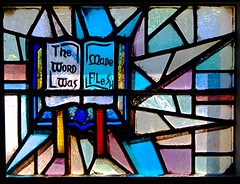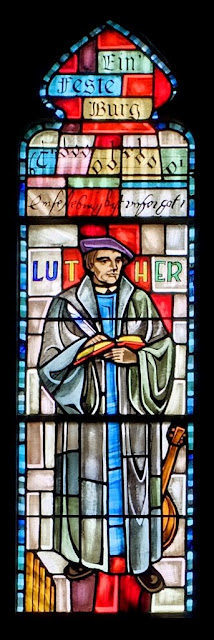By Pastor Paul Wolff
 |
Enter His gates with thanksgiving.
Psalm 100 |
The Christmas season is filled with music and singing. There are so many wonderful songs and carols and hymns that proclaim the wonders of the incarnation of God in the person of Jesus Christ that without them Christmas would feel very different. Every Holy Day in the Christian church has its own music and songs particular to the specific event being celebrated, but none more so than Christmas. The Christmas hymns and carols are so joyful and memorable that they are in a class by themselves.
The music of Christmas has been such an important part of the celebration for centuries that even non-believers have written songs for the season. Many of the songs we hear at Christmas time have nothing to do with the birth of Jesus, nor our forgiveness, nor our salvation, nor anything Christian. This shows just how important the music of Christmas is – that the unbelieving world has to have its own songs to sing at this time which don’t remind them that they are such rotten sinners that God had to become a man in order to save them. But it also brings to mind a question which isn’t often asked: Does Jesus sing?
Notice that I didn’t ask, “Did Jesus sing?” That is a valid question, and I will answer that, too, but although Jesus died around 1,985 years ago (as of 2014), Jesus also rose from the dead and remains a man today, even though He rules creation as the Almighty God and is present everywhere. If Jesus sang during His life and ministry up to His death, then it would be easy to suppose that He still would enjoy singing even in His glorified state.
“And when they had sung a hymn, they went out to the Mount of Olives.”
(Matthew 26:30; Mark 14:26)
 |
| The Last Supper |
The references here are the only verses in the Gospels which suggest to us that, during His earthly ministry, Jesus was a singer, but that is more than enough. I find it interesting that both Matthew and Mark make note of this particular event using the exact same words. It is also interesting that the occasion of this singing was the celebration of the last Passover meal which Jesus shared with His disciples. This celebration was where Jesus instituted the Lord’s Supper. Immediately after this they went to the Mount of Olives where Jesus would be arrested and put on trial.
As someone who greatly appreciates and treasures the hymns of the Church, I would like to have learned more in the Gospels about Jesus singing. As a Christian, I greatly look forward to hearing Jesus sing praises to God, the Father, for His great mercy in sending Jesus to save us; and to God, the Holy Spirit, for gathering us believers in faith to be with Him forever.
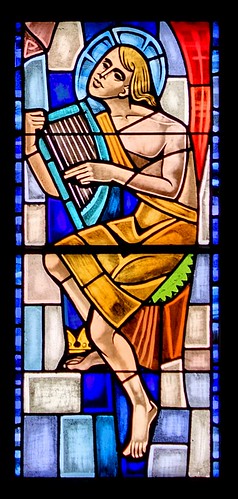 |
David playing the Harp
From Holy Cross Lutheran Church
Detroit, Michigan |
It has been said that the Christian church is a singing church. This has been true even since ancient times in the Old Testament. Consider these verses in the Old Testament:
And Miriam sang to them: “Sing to the Lord, for he is highly exalted. The horse and its rider he has hurled into the sea.” (Exodus 15:21)
The trumpeters and singers joined in unison, as with one voice, to give praise and thanks to the Lord. Accompanied by trumpets, cymbals and other instruments, they raised their voices in praise to the Lord and sang: “He is good; his love endures forever.” (2 Chronicles 5:13)
Sing praises to the Lord, enthroned in Zion; proclaim among the nations what he has done. (Psalm 9:11)
Sing to the Lord, you saints of his; praise his holy name. (Psalm 30:4)
Sing to God, sing praise to his name, extol him who rides on the clouds – his name is the Lord – and rejoice before him. (Psalm 68:4)
 |
Enter into His courts with praise
Psalm 100 |
Sing to the Lord a new song; sing to the Lord, all the earth. Sing to the Lord, praise his name; proclaim his salvation day after day. Declare his glory among the nations, his marvelous deeds among all peoples. (Psalm 96:1-3)
Sing to the Lord a new song, for he has done marvelous things; his right hand and his holy arm have worked salvation for him. (Psalm 98:1)
Shout for joy to the Lord, all the earth, burst into jubilant song with music; make music to the Lord with the harp, with the harp and the sound of singing, with trumpets and the blast of the ram’s horn – shout for joy before the Lord, the King. (Psalm 98:4-6)
Shout for joy to the Lord, all the earth. Worship the Lord with gladness; come before him with joyful songs. Know that the Lord is God. It is he who made us, and we are his; we are his people, the sheep of his pasture. Enter his gates with thanksgiving and his courts with praise; give thanks to him and praise his name. For the Lord is good and his love endures forever; his faithfulness continues through all generations. (Psalm 100:1-5)
There are many more dozens of verses encouraging believers to sing praises to God. There is a sampling of verses at the end of this article below, but you can do a concordance word search for the words “sing” or “singing” or “sang” or “music” and find hundreds of verses which extol the virtues of singing praise to God and making music to tell what He has done to save us.
You should be careful, however, to read the context in doing a word search. Not all singing is God-pleasing, and not even all that pretends to be praising God really does give God praise. Once someone tried to quote Exodus 32:18 to me to try and promote a certain way of praising God, but if you read the context of Exodus 32 you will see that the Israelites were singing in praise of a false god – a golden idol which they had made in direct conflict with God’s First Commandment. This type of praise (pretending to praise God when you are really praising yourself) is not pleasing to God and in reality makes Him angry (because no false god can save us from our sins – only Jesus has done that.)
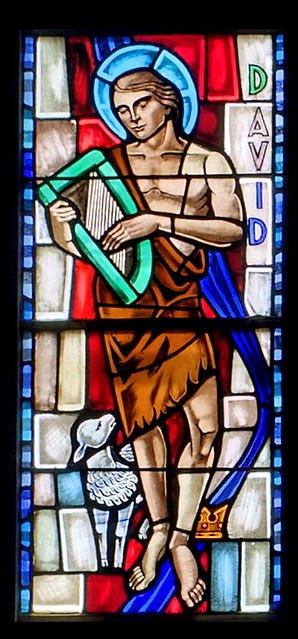 |
Window from Holy Cross Lutheran Church
Detroit, Michigan |
In fact, there is so much singing in the Scriptures that even without Matthew 26:30 and Mark 14:26 we would almost have to conclude that Jesus is a singer, but with those verses we could say this explains why the Scriptures gladly promote singing as a great gift from God, except when such singing is used to glorify ourselves or some other false god.
The Psalms were the hymns of the Old Testament times. Many of them were written by David, who sang Psalms to King Saul in order to give him comfort when he was tormented by evil spirits. Many (if not most) of the Psalms point to Jesus in a prophetic way. Jesus quoted Psalm 22 when He was hanging on the cross and Christians cannot read Psalm 22 without seeing that entire Psalm as being fulfilled by Jesus on Good Friday. Since Jesus fulfilled all the prophesies of the Old Testament (see Matthew 5:17) and kept God’s commands perfectly (see Hebrews 9:14 and 1 Peter 1:19), so Jesus also must have sung praise to God the Father for sending Him to win our salvation and save us. If such singing is truly a good thing for us sinners to do and is praiseworthy, then it certainly was praiseworthy for the Son of God to sing praises to His Father since He humbled Himself in obedience for our sake (see Philippians 2:5-8). We should not think that we could enjoy something truly good and righteous that Jesus did not, lest we think we are more righteous than God, Himself. That was the Pharisees’ conceit, and their downfall.
By faith we can say that we hear the voice of Jesus whenever we hear people singing proper praises to God. This can happen when we hear great works like Handel’s “Messiah” or Bach’s liturgical works, or when we hear our choir and congregation singing in Church, or when we hear Christian Christmas carols, or even when a father or mother sings songs or hymns about Jesus to their children.
 |
Window from Holy Cross Lutheran Church
Detroit, Michigan |
Martin Luther also extolled music and singing as a gift from God. He wrote:
“Next to the Word of God, music deserves the highest praise. … For whether you wish to comfort the sad, to terrify the happy, to encourage the despairing, to humble the proud, to calm the passionate, or to appease those full of hate … what more effective means than music could you find? The Holy Ghost himself honors (music) as an instrument for his proper work when in his Holy Scriptures he asserts that through her his gifts were instilled in the prophets, namely, the inclination to all virtues, as can be seen in Elisha [II Kings 3:15]. On the other hand, she serves to cast out Satan, the instigator of all sins, as is shown in Saul, the king of Israel.” *
Because music and singing is so highly praised in the Holy Scriptures as a great gift from God and a great way to proclaim His praises, we can be sure that Jesus also enjoyed and made use of this great gift. We also have Matthew and Mark’s accounts which tell us that Jesus and His disciples sang on at least one occasion, and if they sang during this religious ceremony, they probably sang at other times as well. As a Christian I look forward to meeting Jesus at His return, and singing praise to Him for being my savior. I also look forward to also hearing Jesus sing praise to God the Father and God the Holy Spirit for their work in bringing salvation to all believers.
Have a merry Christmas and enjoy all the beautiful songs which tell how God was born as a baby to pay for our sins and win our salvation through His life and through His death on the cross.
A Sampling of Bible Verses Which Encourage Singing
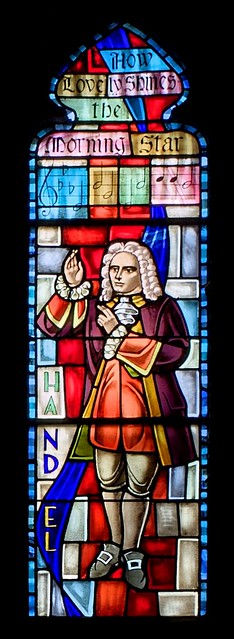 |
Window from Holy Cross Lutheran Church
Detroit, Michigan |
I will give thanks to the Lord because of his righteousness and will sing praise to the name of the Lord Most High. (Psalm 7:17)
I will sing to the Lord, because he has dealt bountifully with me. (Psalm 13:6)
Be exalted, O Lord, in your strength; we will sing and praise your might. (Psalm 21:13)
Hear, O Lord, and be merciful to me; O Lord, be my help. You turned my wailing into dancing; you removed my sackcloth and clothed me with joy, that my heart may sing to you and not be silent. O Lord my God, I will give you thanks forever. (Psalm 30:10-12)
I will praise you, O Lord, among the nations; I will sing of you among the peoples. (Psalm 57:9)
Sing to God, O kingdoms of the earth, sing praise to the Lord, (Selah) to him who rides the ancient skies above, who thunders with mighty voice. (Psalm 68:32-33)
I will sing of the Lord’s great love forever; with my mouth I will make your faithfulness known through all generations. (Psalm 89:1)
It is good to praise the Lord and make music to your name, O Most High. (Psalm 92:1)
For you make me glad by your deeds, O Lord; I sing for joy at the works of your hands. (Psalm 92:4)
Come, let us sing for joy to the Lord; let us shout aloud to the Rock of our salvation. Let us come before him with thanksgiving and extol him with music and song. (Psalm 95:1-2)
I will sing of your love and justice; to you, O Lord, I will sing praise. (Psalm 101:1)
I will sing to the Lord all my life; I will sing praise to my God as long as I live. (Psalm 104:33)
Praise the Lord, for the Lord is good; sing praise to his name, for that is pleasant. (Psalm 135:3)
I will praise you, O Lord, with all my heart; before the “gods” I will sing your praise. (Psalm 138:1)
I will sing a new song to you, O God; on the ten-stringed lyre I will make music to you. (Psalm 144:9)
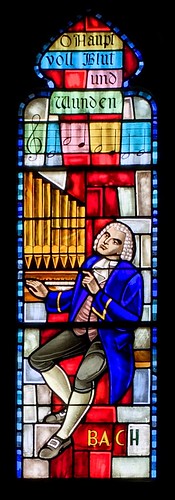 |
Window from Holy Cross Lutheran Church
Detroit, Michigan |
I will praise the Lord all my life; I will sing praise to my God as long as I live. (Psalm 146:2)
Praise the Lord. How good it is to sing praises to our God, how pleasant and fitting to praise him! (Psalm 147:1)
Sing to the Lord with thanksgiving; make music to our God on the harp. (Psalm 147:7)
Praise the Lord. Sing to the Lord a new song, his praise in the assembly of the saints. (Psalm 149:1)
Do not get drunk on wine, which leads to debauchery. Instead, be filled with the Spirit. Speak to one another with psalms, hymns and spiritual songs. Sing and make music in your heart to the Lord, always giving thanks to God the Father for everything, in the name of our Lord Jesus Christ. (Ephesians 5:18-20)
Let the word of Christ dwell in you richly as you teach and admonish one another with all wisdom, and as you sing psalms, hymns and spiritual songs with gratitude in your hearts to God. (Colossians 3:16)
And they sang a new song before the throne and before the four living creatures and the elders. No one could learn the song except the 144,000 who had been redeemed from the earth. (Revelation 14:3)
And I saw what looked like a sea of glass mixed with fire and, standing beside the sea, those who had been victorious over the beast and his image and over the number of his name. They held harps given them by God and sang the song of Moses the servant of God and the song of the Lamb: “Great and marvelous are your deeds, Lord God Almighty. Just and true are your ways, King of the ages. Who will not fear you, O Lord, and bring glory to your name? For you alone are holy. All nations will come and worship before you, for your righteous acts have been revealed.” (Revelation 15:2-4)
* Martin Luther quote from:
Luther’s
Works, Vol. 53 : Liturgy and Hymns. Philadelphia : Fortress
Press, 1999, (c) 1965 (Luther’s Works 53), S. 53:323

